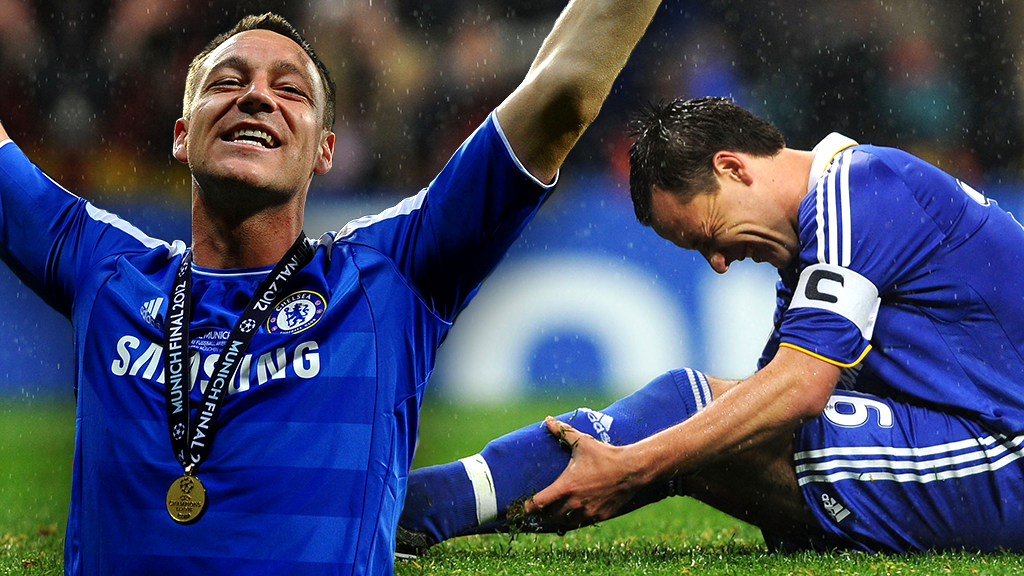John Terry: Chelsea's greatest captain prepares to leave Stamford Bridge
- Published
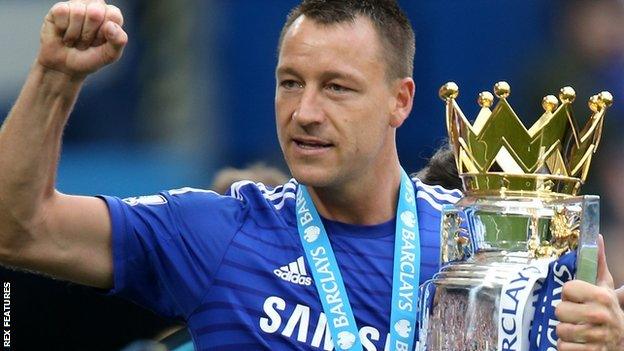
John Terry has been involved with Chelsea since he was 14
John Terry will bring the curtain down on his Chelsea career and a golden Stamford Bridge era when he leaves the club after 22 years at the end of this season.
Chelsea and Terry announced the mutual decision in low-key fashion after a campaign in which the 36-year-old club captain has been reduced to the ranks, barely figuring as manager Antonio Conte has led them to the top of the Premier League table.
Terry may have been marginalised by injuries, advancing years and the progress of others in the new Chelsea age - but he still stands as the symbol of the years of success stretching back to the appointment of Jose Mourinho in 2004 and the club's first title in 50 years, claimed in the manager's first season.
So, as Barking-born Terry prepares to say farewell to his beloved Stamford Bridge, how will a player and personality who has polarised opinion be remembered?
Chelsea's iconic captain
The banner that is still draped from Stamford Bridge's Matthew Harding Stand finds few dissenters among Chelsea's fans as it is emblazoned with the message: "JT. Captain. Leader. Legend."
Those words are now part of Chelsea's vocabulary and were referenced in the club statement announcing his departure. They were a tribute throughout Terry's career and will be his epitaph when he has left.
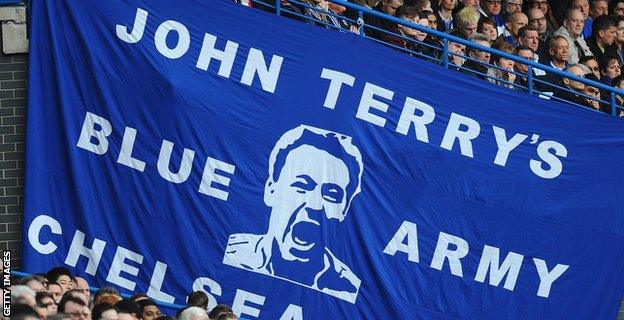
Chelsea fans displayed banners when Terry was banned for racially abusing QPR defender Anton Ferdinand
Terry may have been a divisive figure outside Stamford Bridge but inside he is regarded as the warrior who led Chelsea into battle, one of the most significant figures in the club's history and a towering player who can take his place among the greats.
When Roman Abramovich arrived at Chelsea to change the face of the Premier League in 2003, it was Terry who remained firmly at the helm as a succession of managers - many hugely successful such as Mourinho and the double-winning Carlo Ancelotti - came and went. And in Mourinho's case went, came back and then went again.
The statistics - whether he found favour or not - are testament to his talent and undisputed evidence of what he has meant to Chelsea.
Terry has made 713 appearances for Chelsea since his debut as a late substitute in a League Cup tie with Aston Villa on 28 October 1998. He is third in the all-time appearance list behind Ron Harris and Peter Bonetti, scoring 66 goals and captaining Chelsea a record 578 times.
He has had a silver-lined career which included four Premier League titles, five FA Cups and three League Cups - including that domestic "Double" under Ancelotti in 2010.
Terry was also gifted the Champions League and Europe League in the roll of honour delivered with his abdication statement although he never played against Bayern Munich in the Champions League final in 2012 and against Benfica in the Europa League final a year later, events which encompass the darker side of his career.
Terry is worshipped by supporters who regard him as their representative on the pitch. He is man who plays as they would given the chance - and the fact that he was among the most outstanding central defenders of his generation only added to his lustre.
He was the manager's voice on the pitch and had a sure touch with fans off it, often rounding off his captain's programme notes with the rallying cry: "Come On The Chels!"
Terry was the great organiser, leader and talisman as Chelsea battled for domestic supremacy with Manchester United and Arsenal and European glory alongside the superpowers at home and abroad.
John Terry retires: Watch defender's first goal for Chelsea
This has been a low-profile farewell campaign, with Terry barely seen after an early-season injury and a shift in tactical emphasis from manager Conte to employing a three-man defensive system of David Luiz, Gary Cahill and Cesar Azpilicueta, flanked by Victor Moses and Marcos Alonso.
Terry has only played five league games, with four starts, three FA Cup games and two EFL Cup games this season, last starting in the FA Cup at Wolves on 18 February - a grand total of 718 minutes.
Whether he gets the chance of a grand farewell will depend on Chelsea's fortunes between now and the end of the season as they protect a slender four-point gap from Tottenham at the top of the Premier League table.
If the finale goes to Chelsea's plan, then the last game of the season, at home to Sunderland on Sunday, 21 May, is likely to be an occasion high on emotion.
It is certainly a cleaner, more dignified break than it threatened to be when he announced in January 2016 after an FA Cup fourth-round win at MK Dons that he had not been offered a new deal and it was "not going to be a fairytale ending" - an announcement which appeared to come as a surprise to Chelsea.
Fences were mended, a new one-year contract agreed, and while this may not be a fairytale, it is a parting that is amicable, mutual and leaves the door wide open for Terry's return to Stamford Bridge.
Those outside the club often used words other than "Captain. Leader. Legend" to describe Terry but even those who never warmed to him would surely admit to a grudging respect for his ability, success, drive and longevity.
The words of his contemporaries provide the biggest tribute with Jamie Carragher - on opposing sides to Terry in numerous battles against Liverpool - calling him "the best centre-back we've seen in the Premier League era".
The lows of a great career
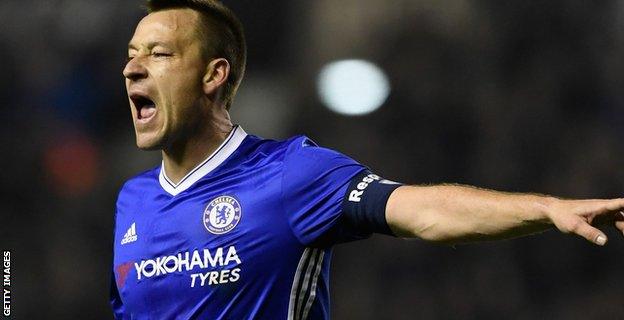
Terry has struggled for regular playing time under Antonio Conte this season
Even as Terry sat on the bench during Chelsea's 2-0 loss to Manchester United on Sunday, Old Trafford was reminding him in colourful terms of arguably the lowest moment of a career that was a story of contrasts.
For all the glory, there was a thread of disappointment and controversy running throughout his time with Chelsea and England that led to him being a personality who split opinion.
United's fans were gleefully recalling the moment that reduced Terry to tears after the Champions League loss on penalties to Sir Alex Ferguson's side in May 2008, when he stepped forward in the Moscow downpour to take what would have been the winning spot-kick, only to slip and hit the post in a moment that will haunt him forever as Chelsea went on to lose.
Terry was even denied redemption when Chelsea finally claimed their holy grail by beating Bayern Munich in their own Allianz Arena four years later under interim manager Roberto di Matteo. Terry missed the final through suspension after he was sent off in the semi-final second leg in Barcelona. He put his kit on for the celebratory photographs but was not part of the winning team and gave the impression of someone with his nose pressed up against the window looking in on the glory.
And when Chelsea beat Benfica in Amsterdam to win the 2013 Europa League, Terry was out injured. This trophy was won under another interim manager, Rafael Benitez, who had a fractious relationship with his captain.
He was also in the headlines off the field during his Chelsea career, most notably in September 2012 when he was banned for four games and fined £220,000 after a Football Association regulatory commission found him guilty of racially abusing then Queens Park Rangers defender Anton Ferdinand during a game at Loftus Road on 23 October 2011.
It was an incident that had an impact on Terry's England career, which he ended with a self-imposed retirement after 78 caps. He had been cleared of abusing Ferdinand at Westminster Magistrates Court in July and felt the FA's decision to pursue a disciplinary hearing made his position "untenable".
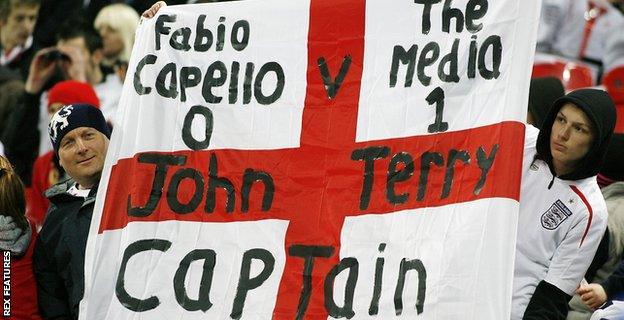
Terry was twice stripped of the England captaincy during his international playing days
Terry had been stripped of the captaincy by the FA over the matter in the previous February, a decision which was the catalyst for the resignation of England manager Fabio Capello, who was critical of the move.
The Italian was a staunch admirer of Terry, even restoring him to the England captaincy 13 months after removing him from the role in February 2010 after allegations the defender had a relationship with the ex-girlfriend of former England and Chelsea team-mate Wayne Bridge - an allegation Terry denied.
There are gaps in the CV. There are controversies that will always be linked to his name. What is beyond dispute is his status as Chelsea's greatest and most successful captain.
The end of an era
Terry's departure breaks the last link in the chain of Chelsea's great generation, the last member of the spine of the teams that brought the club such success since the Millennium.
He was the last of the big beasts from a Chelsea's dressing room almost over-crowded with huge characters, one which occasionally had to answer to accusations it wielded too much power, especially when managers such as Andre Villas-Boas and even the all-conquering Mourinho were sacked, twice in the latter's case.
Terry was a pivotal figure surrounded by the likes of goalkeeper Petr Cech, full-back Ashley Cole, England colleague Frank Lampard and the great striker Didier Drogba, all Stamford Bridge giants.
It is now time for Chelsea's new breed to take the club forward without the player and personality who has been a pillar of their success.
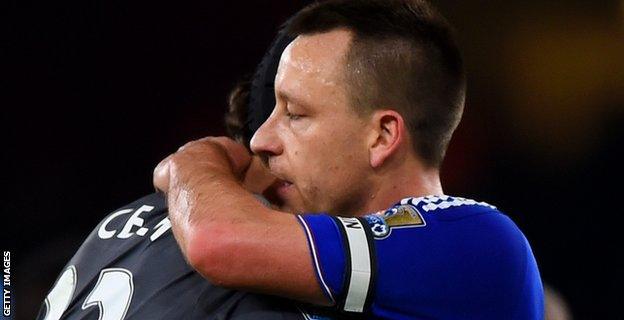
Terry has captained Chelsea 578 times, more than any other Blues player
Where next for Terry?
Clubs around the globe will have been alerted by Terry's declaration that he intends to continue his playing career.
It is hard, rather like Steven Gerrard and Jamie Carragher at Liverpool, to see Terry pulling on the shirt of a Premier League club other than Chelsea - but Bournemouth manager Eddie Howe has been interested in him before and may try again.
West Bromwich Albion manager Tony Pulis is another who will have noted Terry's decision with interest, although it remains to be seen whether the interest is reciprocated.
There are the more obvious potential destinations for Terry such as Major League Soccer in the United States, which was a stop-off before retirement for former Chelsea and England team-mate Lampard at New York City FC and Gerrard at LA Galaxy - where another ex-colleague Ashley Cole currently plays.
Does Terry, however, have the current status to make him attractive to an MLS team at his age and with barely a game to his name in 12 months?
China is an obvious and lucrative option. Terry has been linked with a move to Guangzhou Evergrande Taobao, who are coached by former Chelsea manager Luiz Felipe Scolari.
Chelsea to China is already a well-worn route with Ramires at Jiangsu Suning, Oscar at Shanghai SIPG and Jon Obi Mikel at Tianjin TEDA.
An opportunity in Qatar may also be offered - and Terry is unlikely to be short of options for his final move.
- Published17 April 2017
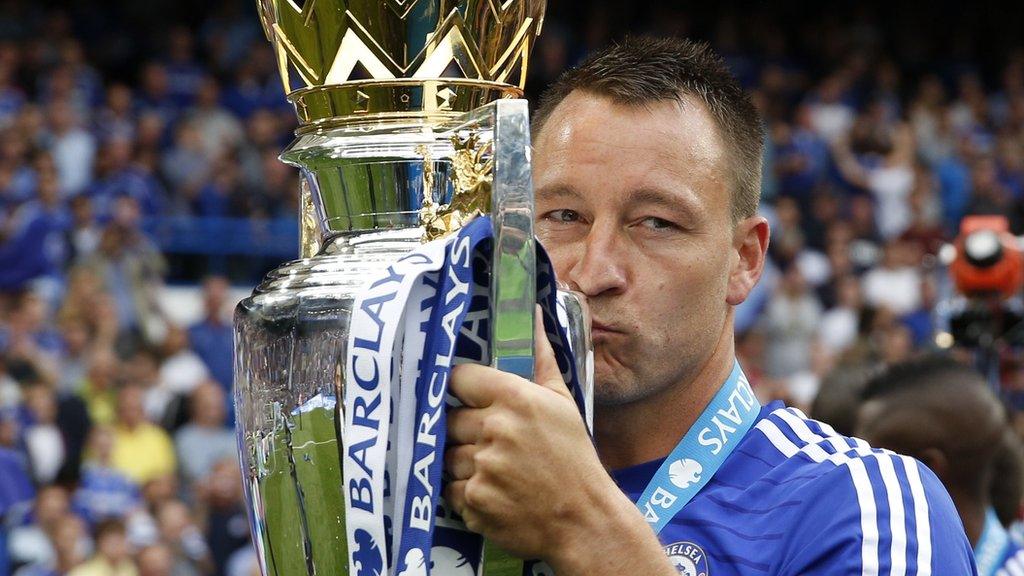
- Published7 October 2018
